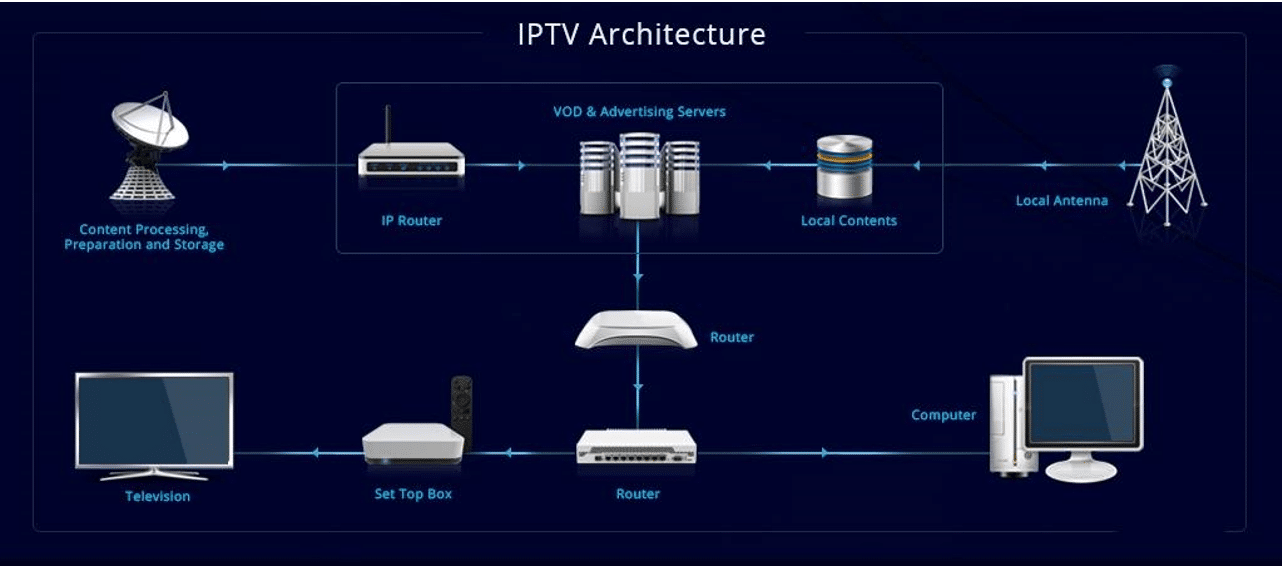Instead of using broadcast TV, cable TV, or satellite signals, IPTV (Internet Protocol television) uses the Transmission Control Protocol/Internet Protocol (TCP/IP) suite to deliver television programming and other visual material.
A service provider will often offer an IPTV service that transmits live TV or on-demand video content through IP networks.
It is possible to utilise an IPTV system to deliver video content through a private network in an organisation, however due to complexity, network latency, and scaling concerns, such implementations are much less prevalent than subscriber-based models.
How Does IPTV Work?
Traditional channel surfing is very different from IPTV, which is much more like internet browsing. The videos are simply delivered to the viewer using the transport technology IP (Internet technology), which is a delivery method. Video from many sources (servers) is split up and delivered over the internet when the viewer clicks on any TV programme or requests the video. With the help of an internet connection, video servers send requests out and return shows to existing homes using fiber-optic cable.
To further grasp how IPTV functions, let’s look at its architecture.
Architecture for IPTV
There are two primary forms of IPTV architecture that can be taken into consideration for IPTV deployment: centralised and dispersed. This depends on the network architecture of the service provider.
The centralised architectural paradigm is an effective and manageable approach. It does not need a complex content distribution infrastructure because all media content is stored on centralised servers. A network that deploys relatively few VOD services, has a sufficient amount of core and edge bandwidth, and has a productive content delivery network (CDN) is typically a strong candidate for a centralised architecture.
Although distributed design provides advantages in bandwidth utilisation and built-in system management tools that are necessary for managing a bigger server network, it is not any more scalable than the centralised model. Operators should therefore think about establishing a distributed architectural model from the beginning if they intend to deploy a sizable system. The effective transmission of multimedia content through the service provider’s network must be augmented by intelligent and sophisticated content distribution solutions.
Commercial and corporate
Since roughly 2002, IPTV has been extensively used to broadcast television and audio-visual (AV) content around commercial sites and business locations, whether it be live IPTV channels or Video on Demand (VOD). Airports, schools, offices, hotels, and sports stadiums are just a few examples of commercial users.
Hospitals, assisted living, elder care facilities, and nursing homes all include in-room entertainment systems that provide hotel rooms and other hotel locations with in-suite television programming. Depending on the service and the policy of the particular hotel or hotel chain, the guest may be charged for certain services or they may be free. Typically, a remote control is used to operate these services.
Types of IPTV Providers
Legal and unauthorized IPTV services are the two categories of IPTV providers available. Let’s talk about them and see how they differ from one another.
Legal IPTV Services
There is a quick method to determine whether an IPTV service is legitimate or not. It is acceptable to use and download the IPTV trends app in your location if it is offered on the Amazon App Store or Google Play store.
Since they are authorized by Google and Amazon to be distributed through the Google Play Store or Amazon App Store, we can vouch for their validity. If any illicit TV shows or films are streamed through these IPTV apps, Amazon and Google will both be held accountable for copyright infringement.
Unverified IPTV Services
Unverified IPTV services are ones that aren’t present in well-known app stores. These are typically less expensive than other legitimate IPTV providers.
To use the apps on the supported devices, users must side load them. Due to the nature of IPTV services, Fire Stick Tricks is unable to confirm the legitimacy of each IPTV service globally. So, we refer to them as Best IPTV services that are unverified.
Is IPTV a legal service?
As long as the service provider has the appropriate licences for every piece of content it offers, IPTV is legal. To host broadcasts of TV shows, films, or other work that is protected by a copyright, an Best IPTV operator must obtain the owner’s consent. It’s entirely legal to use services like Netflix and Amazon Prime Video.
Types of IPTV Services
Popular IPTV services include those that:
Video on Demand (VOD)
Our goal is to make the explanation as straightforward as we can. As a result, we won’t get into the specifics and technical lingo of Video on Demand, a type of IPTV format or service. ‘Video on Demand’ is a word that needs no further explanation. On weekends, the majority of us become couch potatoes and watch Netflix.
VOD is exactly what the streaming services are that we have grown quite accustomed to. Video on Demand is exemplified by major streaming platforms including Netflix, Amazon Prime, Hulu, and the most recent competitor, Disney. These services, which use a subscriber-based business model, are among the most well-known types of IPTV services.
Live Television
You refer to watching TV shows and sports in real-time as live television. Real-time content is mostly offered for reality TV shows, award shows like the Oscars and Golden Globes, and sporting events. You could assume that it would be similar to live television programmers that are broadcast on your TV, however live TV with IPTV is different.
Instead of coaxial cable, the content is broadcast via the internet. It is a unique method to watch award presentations and the games of your preferred football team. This has been made possible by services like Sling TV, Fox Sports Go, and Hulu Live TV.
Time-shifted TV
Rewind time is arrived! Does the expression conjure images of time-shifted TV? Yes, it does. You supposedly miss a live broadcast of your preferred basketball team. What would you like to happen in this circumstance? I assume you saw the broadcast you just missed. That is time-shifted television, but it only lasts so long.
You may watch content on Netflix and Hulu whenever you want, despite the fact that it may sound comparable to video on demand. Unless the streaming service decides to remove the TV show or movie from its directory, there is no service life. Users of time-shifted TV can record content, store it, and view it later. But keep in mind that it’s only available while supplies last.
IPTV Subscription
With a single IPTV service, not everyone will be satisfied. While some are looking for live UK TV, while people are hunting for exotic international networks. Some people only want IPTV to watch VoD content. It is very difficult to produce good quality and meet all of these requirements, and most companies fall short in this area. This is the area where this supplier differs from the competition.
They want to offer family-friendly English TV. This suggests that you do not need to squander time sifting through several channels in search of your preferred one. This supplier offers 20k+ VoD titles in addition to 700+ channels featuring adult, sports, movie, and kid-focused programming from Canada, the UK, and the US.
Devices that work with IPTV services
IPTV services can work with a variety of devices including computers, smart TVs, mobile phones, tablets, and more. You can also use internet TV sticks and boxes for IPTV services.
These internet TV sticks and boxes are small digital media players that are easy to setup and use with your favorite IPTV services.
Here is a list of popular internet TV sticks and boxes
- Amazon Fire TV stick
- Now TV Smart Stick
- Roku Streaming Stick
- Apple TV
- Chromecast with Google TV

